How the Fair Trade Commission works
The Japan Fair Trade Commission has launched an investigation into social media advertisements where many violations have been identified.
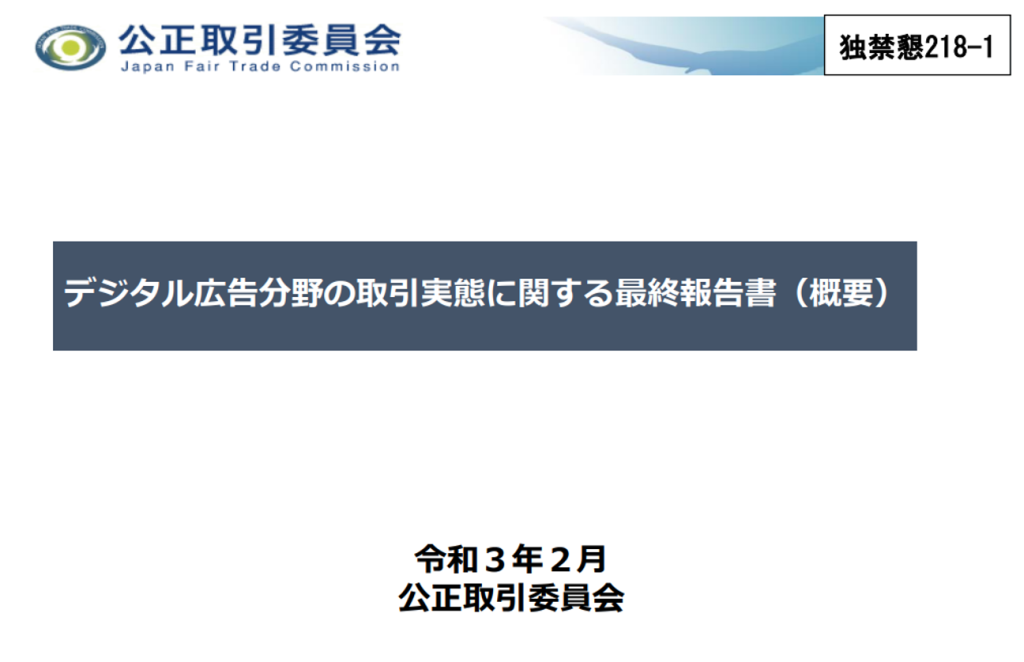
The purpose of the survey is to “ascertain the actual status of digital advertising transactions,” and it is a survey of the actual conditions.
The report was published back in February 2021, and its main purpose is to clarify the current status of transactions and competition surrounding digital platform operators, and to prevent violators from committing such violations.
Unfortunately, most of the contents of the published report do not match the contents of our research, although it does investigate the relationship and problems between digital platform operators and real estate agents who use them.
However, we would like to briefly go over the results of the survey regarding the improper acquisition and use of personal information.
As explained in the previous section, “expressions that impede fair competition” fall under the Act against Unjustifiable Premiums and Misleading Representations, regardless of whether the advertiser is a company or not, and the Consumer Affairs Agency has recognized such advertisements on social media as being made by a business and has issued disciplinary action.
However, in order to issue such an action, the advertisement must fall under Article 5, Item 1 (misrepresentation of quality) or Item 2 (misrepresentation of advantage) of the Act against Unjustifiable Premiums and Misleading Representations, and the Consumer Affairs Agency seems to be having a hard time dealing with such issues.
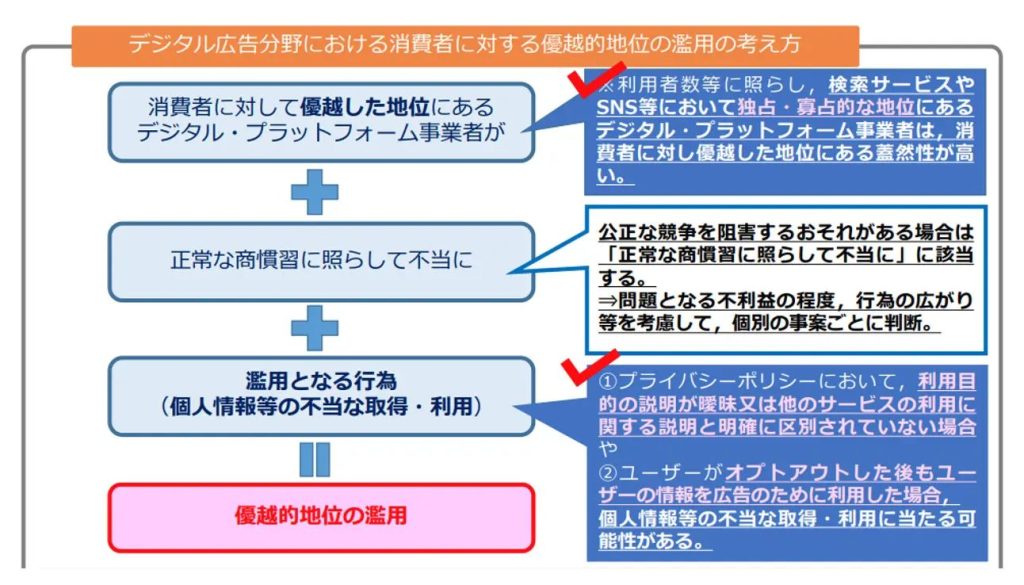
Any expressions that impede fair competition are considered to be “unfair” in light of normal business practices.
For real estate agents, this includes not only posting false information about their services and properties, but also making exaggerated representations.
This also applies to cases where the features and specifications of a property are presented in a more exaggerated manner than they actually are, and to expressions which may lead to unfair comparisons or misunderstandings.
In particular, the issue of stealth marketing, where advertisements are posted on social media sites while concealing the fact that they are advertisements, whether intentionally or not, is becoming more and more apparent.
The Japan Interactive Advertising Association and the WOM Marketing Council, both business organizations, have established voluntary regulations to prevent stealth marketing. Although, they are struggling to deal with the problems due to the characteristics of social media, where anyone can freely transmit information.
Other countries have already enacted laws and regulations against stealth marketing, and since Japan is lagging behind, the Japan Fair Trade Commission and the Consumer Affairs Agency are playing a central role in studying countermeasures.
Current status of social media advertising and measures being considered
If you look through the aforementioned “Study Group on Stealth Marketing” report, you will find it discusses data disclosure and countermeasures against misrepresentation. This can be useful for understanding the current situation.
As you can see, the Internet advertising market is expanding year by year, and the growth rate of advertising on social media such as social media, blogs, and video sharing sites is estimated and forecasted to be as follows.
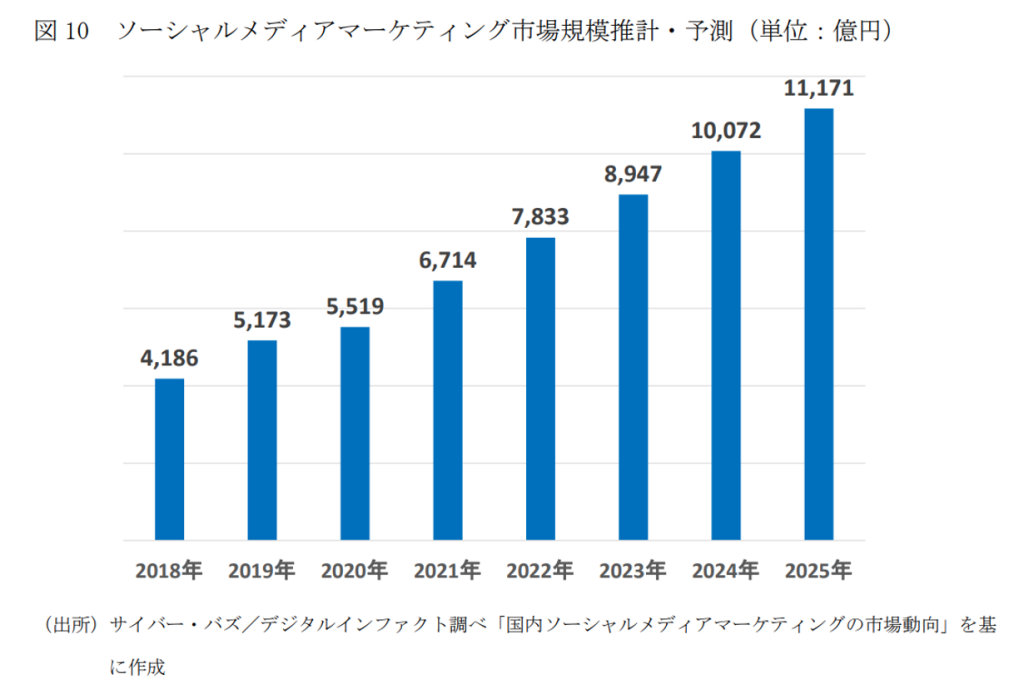
In some cases, these social media advertisements are made by third-party influencers at the request of advertisers. In addition to advertisers directly advertising on social media sites, and in other cases, advertisers are taking advantage of “friendships” on social networking sites.
According to a survey conducted by the secretariat on such social media advertising, about 20 out of 100 posts by influencers were suspected of stealth marketing, or advertising which is “unfair in light of normal business practices” and therefore illegal. Not giving the consumer the disclaimer the post is a paid advertisement.
The report also pointed out the open solicitation of unauthorized reviews on review sites.
Surprisingly, the study also found advertisements “do not clearly indicate that they are advertisements” are more likely to attract general consumers and lead to sales.
Perhaps in anticipation of this effect, the report revealed the reality of stealth advertising which only takes care not to fall under the Law Against Unjustifiable Premiums and Misleading Representations, and only requires an apology when a problem is discovered.
The absence of specific regulations for such stealth advertising, the study group participants called for an immediate government response, claiming that it would only be “harmful” to the entire digital advertising market over the long term.
Pay attention not only to textual information, but also to verbal explanations during video delivery
We have been talking about stealth marketing, advertising, and the Law Against Unjustifiable Premiums and Misleading Representations, so let’s get this out of the way.
First, the law which regulates advertising is the Law Against Unjustifiable Premiums and Misleading Representations.
This law covers all advertisements, including flyers, pamphlets, direct mail, verbal advertisements, billboards, newspapers, magazines, etc. Naturally, it also includes advertisements on social media sites.
Article 5 of the law prohibits the use of improper labeling (misrepresentation of quality) for these advertisements, and while the original authority for this is vested in the Prime Minister, the law delegates this authority to the Commissioner of the Consumer Affairs Agency, and further delegates part of this authority to the Fair Trade Commission in accordance with the provisions of paragraph 2 of the same article.
Furthermore, the “Fair Competition Code Concerning Real Estate Representation” has been established with the approval of the Fair Trade Commission.
If we understand this process, we will understand that as long as we as real estate agents comply with the “Fair Competition Code Concerning Representation of Real Estate,” we will not be in violation of the Act against Unjustifiable Premiums and Misleading Representations, which is the basis of the code.
It is also important to understand if you verbally advertise your company or introduce a property on a video site such as YouTube, the content of the commentary will be classified as an advertisement and subject to regulation.
For example, let’s say a video is taken of the interior of a house for sale and the comment is made, “As you can see, the living room is spacious and has excellent sunlight.
Describing the living room as spacious without clearly indicating the object of comparison and describing the sunlight as “outstanding” are considered exaggerated expressions prohibited by the “Fair Competition Code Concerning Real Estate Representation,” even if they were used casually.
Even if the same explanation is given to a customer at a preliminary inspection, because the evidence is not a fact which remains, even if it is pointed out at a later date. This then t will become “he said she said” even if the YouTube video is deleted.
The evidence of the violation of the “Fair Competition Code Concerning Real Estate Representation” will remain semi-permanently.
The same is true of social media sites. Hyperbole can be shared and pointed out when the person in question forgets about it.
Even if unintentional, if a person forgets to delete such a post or if it spreads, there is still a possibility it can be subject to disciplinary action at any point in time.
In this regard, there remains the concern that real estate advertising is incompatible with social media sites, where the accumulation of posts leads to the development of accounts.
Just because it is easy to post does not mean that the content of the post should be simplified.
Provide objective information and concrete data, and be sure to use expressions which do not violate the Fair Competition Code. If the property is currently for sale, it is important to understand the same level of consideration as ordinary advertisements. Such as clearly stating the advertisement may be terminated due to a sales contract or other reason.
It is also important for those in positions of responsibility, such as managers and supervisors, to understand and instruct that if an employee, at his or her own discretion, posts a YouTube video or social media post which violates the “Fair Competition Code Concerning Real Estate Representation,” the business may also be held responsible.
Learning from the Fair Trade Council: Violated Cases
As mentioned above, the Real Estate Fair Trade Councils of each of the nine regions in Japan, including Hokkaido, Tohoku, and the Tokyo metropolitan area, are responsible for investigating violations, taking corrective action, and levying and collecting surcharges/penalties for all real estate advertising violations which included social media violations.
The regional Real Estate Fair Trade Councils release information on “penalty/surcharges,” but the “JFTC News” published on the website of the Metropolitan Area Real Estate Fair Trade Councils is the best organized and easiest to read.
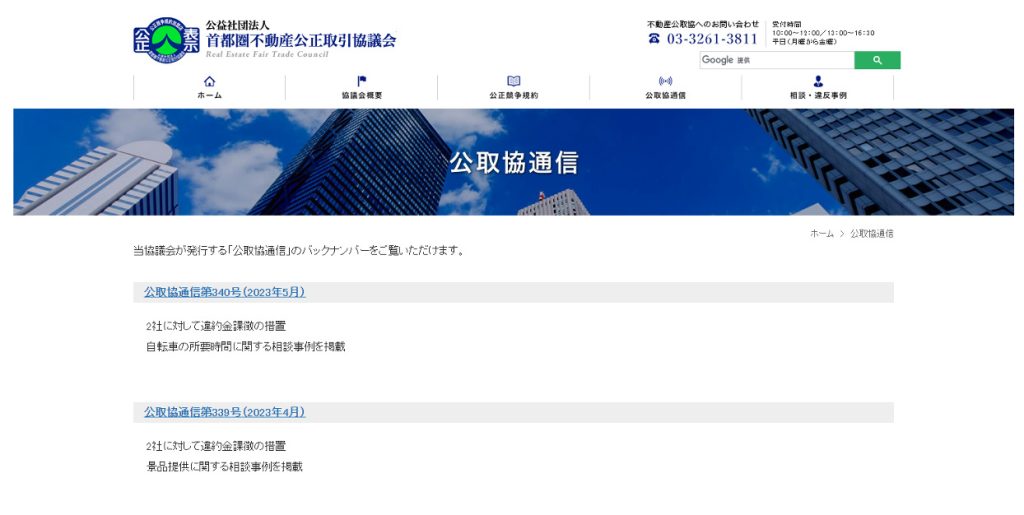
The site is available at the following URL
https://www.sfkoutori.or.jp/koutorikyotsushin/
The site contains back numbered information about penalty surcharges as well as warnings and cautions.
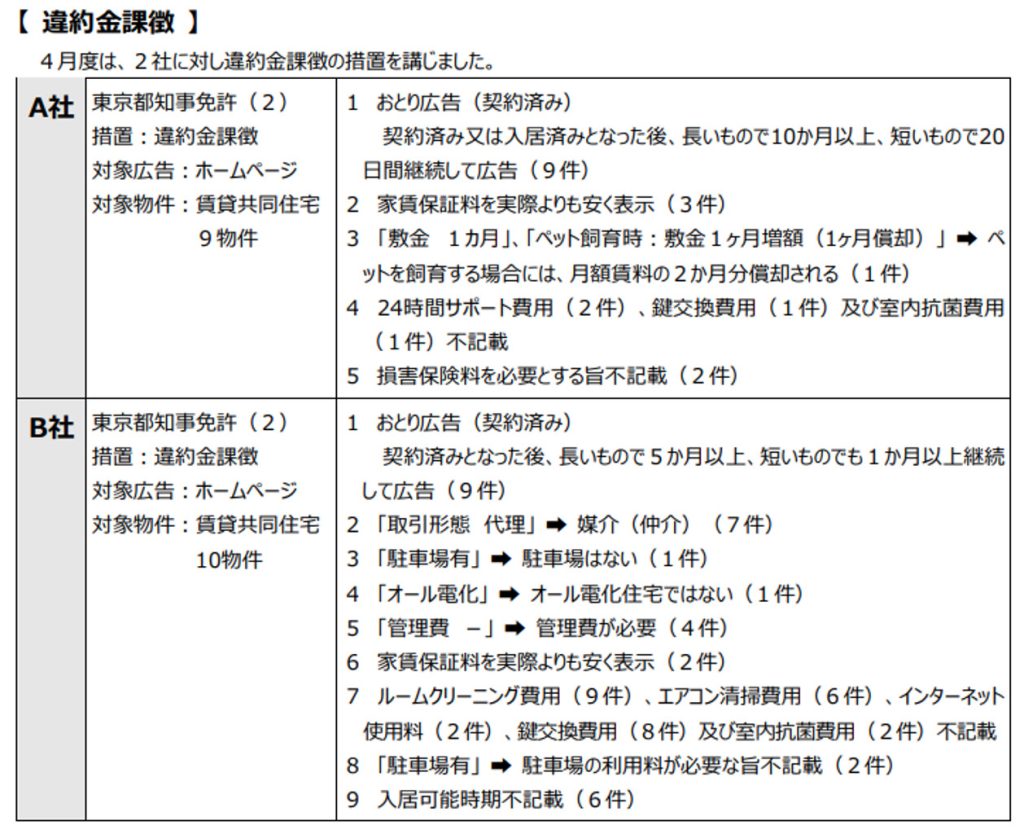
By reading these, you will understand what kind of advertisement are considered problematic and subject to punishment.
Most of the media that have been the cause of penalty/surcharges, warnings, and cautions are homepages and portal sites that do not include the required information, misrepresentations, and bait advertisements.
To date, no action orders have been issued for social media advertisements, but the degree of information posted on social media advertisements is even more egregious those on homepages and portal sites.
While we are still awaiting the opinions of the Consumer Affairs Agency and the JFTC, we have received information that the Fair Trade Councils are already conducting investigations into social media advertising.
We should not be naive enough to think social media is safe, but rather we should thoroughly comply with the rules if we are going to transmit information on any platform.

For additional information or any questions please contact us here
Email: info@remax-apex.com

